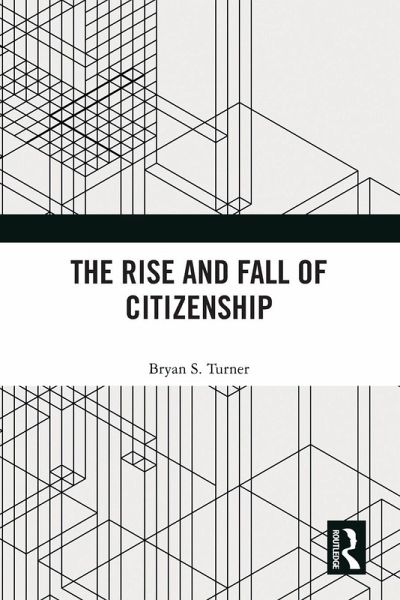"This collection of essays published across several decades is a testimony to the outstanding contribution Bryan Turner has made to sociology of citizenship. With three additional original chapters, the book provides a renewed focus on citizenship as the condition of community and civility. Turner charts the rise of citizenship in democratic societies between the 1940s and 1980s and shows how 'successful' democratic societies developed community, cultivated civility, and provided social security through citizenship as their enabler and guarantor. Turner then charts the fall of citizenship between the 1980s and 2020s as the decline of community and civility. By convincingly establishing citizenship as a condition for democratic societies, the book challenges and urges scholars and students in the humanities and social sciences to become its guardians and interrogators."
Engin Isin, Professor Emeritus in International Politics, Queen Mary University of London, UK
"For decades, Bryan S. Turner has been the most creative sociologist on the modern institution of citizenship. In this collection of essays, including new ones that reflect on the condition of citizenship today, what it might mean any longer and which political and moral obligations we can still derive from it, Turner offers a tour de force of the sociological and liberal tradition of citizenship. From the social, economic, political, and cultural roots that formed our western understanding of it to its obvious decline; from the time of western citizens gaining more rights in social struggles to its erosion in the face of neoliberalism having destroyed the post-War social contract; and with regard to considerations of what citizenship might (still) mean today and how it might continue to operate as providing for civility, solidarity and preserve an idea of the common good - these essays are in a way the legacy of one of the most important modern sociologists on citizenship."
Jürgen Mackert, Professor of Sociology, University of Potsdam, Germany
"Bryan Turner is known for his pioneering approach to contemporary citizenship studies and its impact in placing citizenship firmly at the centre of contemporary sociological enquiry. Viewing citizenship through the lens of equality, community and civility, this book brings together Turner's existing publications with three new chapters, which in combination cover a wide array of theoretical approaches, while also tracing the expansion and erosion of citizenship rights. Set in the context of a predominantly British and North American paradigm, the book traces the expansionary post-war promise of citizenship, while noting its gendered blind spots, its sometimes troubled encounters with universal rights and multi-culturalism, and its contemporary decline. This decline in manifest not only in the stalled delivery and active contraction of social rights, but in the resistance to viewing migration as a positive asset, and the failures of citizenship and 'membership' when measured against a law of hospitality. So here we have a book that offers both a 'state of the art' review and a pressing agenda for future scholars."
Lydia D. Morris, Professor of Sociology, University of Essex, UK
Engin Isin, Professor Emeritus in International Politics, Queen Mary University of London, UK
"For decades, Bryan S. Turner has been the most creative sociologist on the modern institution of citizenship. In this collection of essays, including new ones that reflect on the condition of citizenship today, what it might mean any longer and which political and moral obligations we can still derive from it, Turner offers a tour de force of the sociological and liberal tradition of citizenship. From the social, economic, political, and cultural roots that formed our western understanding of it to its obvious decline; from the time of western citizens gaining more rights in social struggles to its erosion in the face of neoliberalism having destroyed the post-War social contract; and with regard to considerations of what citizenship might (still) mean today and how it might continue to operate as providing for civility, solidarity and preserve an idea of the common good - these essays are in a way the legacy of one of the most important modern sociologists on citizenship."
Jürgen Mackert, Professor of Sociology, University of Potsdam, Germany
"Bryan Turner is known for his pioneering approach to contemporary citizenship studies and its impact in placing citizenship firmly at the centre of contemporary sociological enquiry. Viewing citizenship through the lens of equality, community and civility, this book brings together Turner's existing publications with three new chapters, which in combination cover a wide array of theoretical approaches, while also tracing the expansion and erosion of citizenship rights. Set in the context of a predominantly British and North American paradigm, the book traces the expansionary post-war promise of citizenship, while noting its gendered blind spots, its sometimes troubled encounters with universal rights and multi-culturalism, and its contemporary decline. This decline in manifest not only in the stalled delivery and active contraction of social rights, but in the resistance to viewing migration as a positive asset, and the failures of citizenship and 'membership' when measured against a law of hospitality. So here we have a book that offers both a 'state of the art' review and a pressing agenda for future scholars."
Lydia D. Morris, Professor of Sociology, University of Essex, UK








